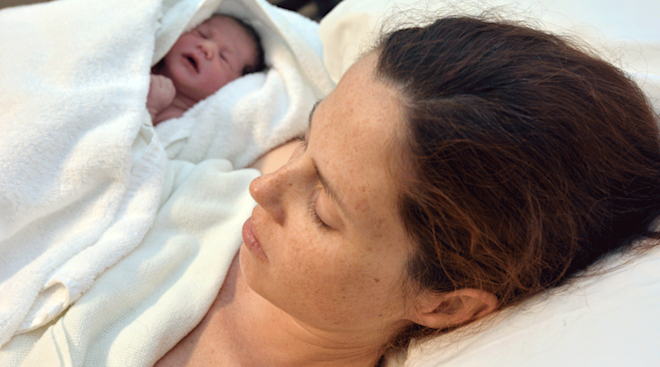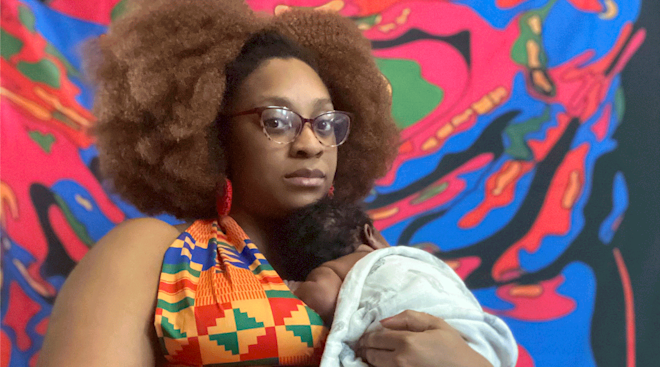OBs Reveal How Their Own Childbirth Changed Them as a Doctor
Pregnancy is a life-altering experience, so it’s only natural that doctors who go through childbirth themselves emerge with a slightly different perspective—both on life, and on their professional practice. We caught up with a few ob-gyns to learn how their own labor and delivery experience has influenced the way they guide their patients through the very same process.
My experiences shape the questions I ask my patients.
“Though I had cared for hundreds of women through pregnancy and labor and delivery, having my own babies added to my understanding of the experience of pregnancy and childbirth. I tell my patients that it’s my job to share my medical knowledge and expertise with them, but they’re the experts on their preferences and experience. Having my kids meant I had my own experience to draw on when asking and answering questions. As a maternal-fetal medicine specialist who has cared for many women with high-risk pregnancies, I think having my own baby in the NICU gave me a deeper understanding of the logistics and emotions of that part of the experience.” —Anjali Kaimal, MD, a maternal-fetal medicine (MFM) specialist and director of the MFM fellowship program at Massachusetts General Hospital in Boston, and mom of two.
Watch, Hospital Bag Essentials During Covid-19:
Now I take the time to fully explain what to expect during labor.
“My childbirth experience was amazing. There was nothing exciting or out of the ordinary and I pushed only three times (most of my patients would hate me if I told them). However, during the actual course of my labor there were many moments where I felt helpless and really nervous about what was happening. This has made me take more time to explain the labor process—why we do things, why nurses do things—so my patients can feel comfortable and well cared for through their entire labor.” —Candice Wood, MD, an ob-gyn at Banner - University Medical Center Phoenix in Arizona, and mom of three.
I’m able to connect to patients on a whole new level.
“Its funny. Because I’ve been a practicing ob-gyn for so long and have talked about labor and delivery with so many patients, I felt like I had gone through it. But now that I actually have, it brings me closer to my patients. When they know that I recently had a baby, we can relate over our labor experiences, taking care of babies, the aftermath of labor, getting our bodies back in shape, the trials and tribulations of motherhood. I can draw from my own experiences. For example, breastfeeding issues were a bit of a foreign concept to me before. I had heard that it’s a challenging process, but I really had no idea until I went through it myself. Now when I’m seeing patients with breastfeeding issues, I can relate on a personal basis and perhaps discuss minor things I otherwise wouldn’t know about, like breast-pump brands and flange sizes.” —Grace Lau, MD, assistant professor of obstetrics and gynecology at NYU Langone Health in New York City, and mom of one.
Having felt all that fear and frustration, I do my best to reassure my patients.
“I had two vaginal deliveries, one with a poorly working epidural and one with a great one. I know how it feels—the pain, the fear, the effort of pushing, the worry and frustration of not knowing. I tell my patients stories of my pregnancies and deliveries. It gives me a way to relate to them and reassure them when I can.” —Monica Mendiola, MD, ob-gyn residency program director at Beth Israel Deaconess Medical Center in Boston, and mom of two.
I’m reminded that there are always exceptions to the rule.
“It was interesting to gauge how accurate my descriptions were of what labor feels like. I used to say that contractions feel like your belly is getting hard and squeezing. It’s something I had heard about and read about, but experiencing it myself was interesting—almost like fact-checking yourself. Funny enough, I didn’t even know when I was in labor. I always told patients to call me when their contractions are four minutes apart, but my contractions stayed at seven to eight minutes. I thought to myself, I’m going to listen to my own rule. By the time I realized I needed to go to the hospital, I was 8 centimeters dilated. Kind of ironic.” —Lau
I’ve adjusted my descriptions of how to recognize the signs of labor.
“My ability to describe how to determine if you’re in labor, if your membranes have ruptured, etc. has changed after having experienced rupturing and contractions at the start of labor. I’ve also experienced Pitocin as augmentation and an induction agent. Knowing these things from a patient perspective has enabled me to better prepare my patients.” —Wood
I now make a point to switch up labor positions.
“I labored pretty traditionally, but I do think if one position doesn’t work, switching it up can help. Holding on to different things with my hands, like a birthing bar, was very helpful. It reminded me that when I coach patients through pushing, I need to continue to try different things and see how I can be even more effective.” —Lau
Experiencing it all for myself reaffirmed what I knew about prenatal care and delivery. “I was really glad to find that my recommendations about care during pregnancy and labor and delivery didn’t significantly change. It was good to know that the recommendations that I had always made worked and made sense to me as a patient as they had as a doctor. ” —Kaimal
Don’t keep your worries to yourself.
“There are so many things to worry about as a pregnant woman. I always felt like I had so many worries and concerns, but I didn’t want to bother my OB too much. But I wouldn’t want my patients to worry alone—I want them to come to me. It’s such a life-changing experience, totally different than anything they’ve ever gone through. I’d encourage women to go to their doctor with any questions or concerns they might have.” —Lau
Assemble the best team you can.
“Birth is an experience that can’t be predicted, but choosing who guides you through it is important. Choosing where you deliver and with what physician team is also important. Investigate their rate of vaginal deliveries before you commit to a doctor.” —Mendiola
Cut yourself some slack.
“Keeping perspective of what you’re doing—creating a human life—can help you endure almost anything through pregnancy and delivery. The reward is life changing! After baby is born, drop every expectation for yourself. Your baby has also just had their world literally rocked as well. Be patient with your child, be patient with your partner, and most importantly, be patient with yourself! No doing your hair, no makeup, no perfectly prepared dinner, no freshly vacuumed carpet and bleached countertops, no party planning, no taking on the world. Take each day one at a time—or more honestly, each feeding one at a time. Your body is going through momentous changes at the exact same time your entire life is.” —Wood
Enjoy every moment.
“When your baby arrives, the days are long but the years are short. The birth and newborn experience feels like everything when it’s happening, but hopefully you’ll have a lifetime with your children, and every day is a new and wonderful adventure.” —Kaimal
Published September 2017
Navigate forward to interact with the calendar and select a date. Press the question mark key to get the keyboard shortcuts for changing dates.





















































